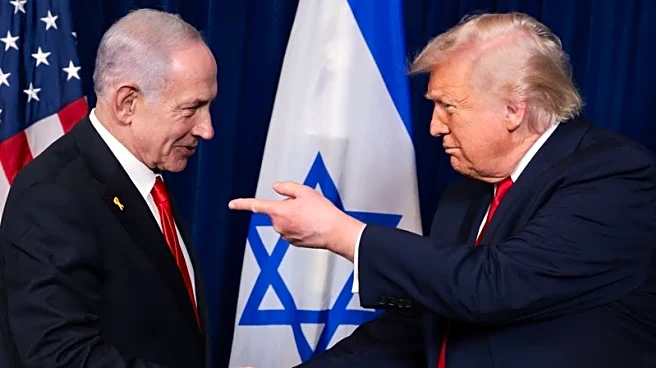What's Happening?
Ukrainian President Volodymyr Zelensky met with U.S. President Donald Trump at the White House, seeking to secure Tomahawk cruise missiles to bolster Ukraine's defense against Russia. Despite cordial discussions,
Trump indicated he was not ready to supply the missiles, citing concerns over escalation. Zelensky had hoped the missiles would weaken Russia's war economy by targeting oil and energy facilities. Trump expressed a desire to end the war without further escalation and suggested that discussions on missile supplies would continue. The meeting followed a phone call between Trump and Russian President Vladimir Putin, where they agreed to meet in Hungary for further talks.
Why It's Important?
The failure to secure Tomahawk missiles is a setback for Ukraine, which views them as crucial for its defense strategy. The U.S. has been a significant supporter of Ukraine, and the decision not to supply these weapons could impact Ukraine's military capabilities and its ability to counter Russian aggression. The meeting underscores the delicate balance the U.S. must maintain in supporting Ukraine while avoiding further escalation with Russia. The ongoing diplomatic efforts highlight the complexities of international relations and the challenges in achieving a peaceful resolution to the conflict.
What's Next?
Trump's upcoming meeting with Putin in Hungary could be pivotal in shaping the future of the Ukraine conflict. The discussions may address the potential for a peace agreement and the role of military support in achieving it. Zelensky's outreach to European leaders following the meeting indicates a continued effort to strengthen alliances and secure support. The geopolitical dynamics in Europe and the U.S.'s role in the conflict will be closely watched as negotiations progress.
Beyond the Headlines
The diplomatic engagements between the U.S., Ukraine, and Russia highlight the broader implications for international security and the balance of power. The potential for missile supplies raises ethical considerations regarding military escalation and the impact on civilian populations. The discussions also reflect the strategic interests of the U.S. in maintaining influence in Eastern Europe and countering Russian expansion.










